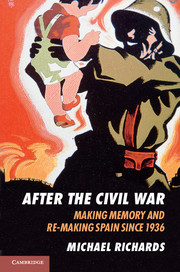Book contents
- Frontmatter
- Contents
- List of maps and tables
- Preface
- Acknowledgements
- Maps
- Introduction: cultural trauma in Spain
- Part I Setting the scene
- Part II Memories of war during the Franco years
- 3 Repression and remembrance: the victors’ liturgy of memory
- 4 Repression and reproduction: social memory in the 1940s
- 5 Memory and politics: from civil war to Cold War
- 6 Memory and migration: flight from the countryside in the 1950s
- 7 Commemorating ‘Franco's peace’: the 25th anniversary of the Victory
- 8 Contesting ‘Franco's peace’: transformation from below in the 1960s
- 9 Transition and reconciliation: politics and the Church in the 1970s
- Part III Memories of war after Franco
- Conclusion: the history of war memories in Spain
- Glossary and abbreviations
- Sources and select bibliography
- Index
- References
7 - Commemorating ‘Franco's peace’: the 25th anniversary of the Victory
Published online by Cambridge University Press: 05 June 2013
- Frontmatter
- Contents
- List of maps and tables
- Preface
- Acknowledgements
- Maps
- Introduction: cultural trauma in Spain
- Part I Setting the scene
- Part II Memories of war during the Franco years
- 3 Repression and remembrance: the victors’ liturgy of memory
- 4 Repression and reproduction: social memory in the 1940s
- 5 Memory and politics: from civil war to Cold War
- 6 Memory and migration: flight from the countryside in the 1950s
- 7 Commemorating ‘Franco's peace’: the 25th anniversary of the Victory
- 8 Contesting ‘Franco's peace’: transformation from below in the 1960s
- 9 Transition and reconciliation: politics and the Church in the 1970s
- Part III Memories of war after Franco
- Conclusion: the history of war memories in Spain
- Glossary and abbreviations
- Sources and select bibliography
- Index
- References
Summary
For us, the fact of the war produces instinctive reactions, whether we like it or not; for those who are 25 or younger, reactions are ‘historical’. Because the war has not really been ‘assimilated’ or ‘absorbed’ by them, they think independently about it, on their own account, whether ‘liberals’ or ‘reactionaries’, and for motives which have nothing to do with memory of the conflict which they cannot have. It is a much more important rupture between generations than is normally produced in any country or at any time.
Official commemoration in 1964 of the twenty-fifth anniversary of Franco's victory depicted 1939 as ‘Year Zero’ by conspicuously comparing the era ‘before’, compressed into a series of images of the Second Republic, with that which came after, crystallised as an epoch of peace and prosperity. Regime legitimacy continued to emanate from the civil war (a ‘necessary’ war, in the official view) and denigration of democracy and the Republic. The quarter-century since the end of the civil war was thus seen as a uniquely ‘compact’ and ‘homogeneous’ period of ‘respect for authority and of political calm’, the significance of which would be difficult to explain ‘to a foreigner’. The 1960s saw an uneasy convergence of socio-economic imperatives, various strands of monarchist opposition, and the political interests of the regime around technocratic change which did not discard the past, but identified certain ‘facts’, acceptable to reforming insiders and, at the same time, surmountable, ‘making them unrepeatable’. New forward-looking myths, founded on the idea of the war as a ‘fratricidal conflict’ (a war between brothers) and of an ‘economic miracle’, replaced symbols and memories encapsulated in the crusade narrative.
- Type
- Chapter
- Information
- After the Civil WarMaking Memory and Re-Making Spain since 1936, pp. 187 - 216Publisher: Cambridge University PressPrint publication year: 2013

